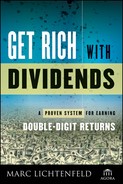REITs
Real Estate Investment Trusts (REITs) are also very popular with income investors. A REIT is a company that has a collection of real estate, usually rental properties. Like an MLP, a REIT does not pay corporate taxes and instead must distribute the profits back to shareholders. So REITs often have fairly high yields.
There are REITs for nearly everything: REITs that specialize in apartment buildings, office buildings, shopping centers, hospitals, medical offices, nursing homes, data storage centers . . .
REITs do not have the same tax implications as MLPs. In an MLP, you are considered a partner in the business. In a REIT, you are a unitholder. The dividends you receive from a REIT will usually be taxed as ordinary income, not at the dividend tax rate, although a portion of the income you receive may be considered return of capital, which would be tax deferred and would lower your cost basis, similar to an MLP. (However, it’s usually a much smaller percentage than with an MLP.)
Again—and I can’t stress this enough—talk to your tax professional about any questions you may have.
REITs can be volatile, just like the real estate market. If real estate values fall, so do the NAVs of the properties owned by the REIT. Additionally, a weak economy can lead to a greater number of vacancies, reducing profits and, as a result, the dividend.
The opposite is true. During the real estate bubble, the MSCI US REIT index rose 43% between January 2005 and January 2007 (of course, many houses appreciated considerably more), but it plummeted 78% over the next two years as real estate prices collapsed.
Examples of REITs include Healthcare REIT (NYSE: HCN), which owns housing facilities for seniors and other health care related properties, and Equity Residential (NYSE: EQR), which is the country’s largest apartment manager.
